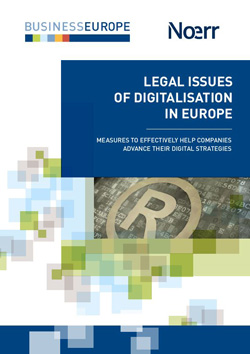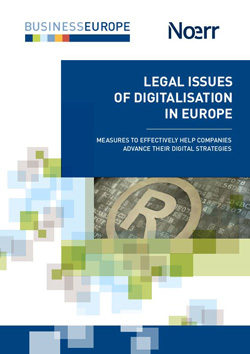Report: Legal issues of digitalisation in Europe
 Europe needs better rules for the digital revolution of the economy. Businesses want a standardised, EU-wide legal framework and room for contractual solutions when dealing with data. This emerges from a cross-European survey carried out by Noerr LLP and BusinessEurope, the European umbrella association of national industrial and employers' associations. Business leaders from companies in 20 different countries were interviewed.
Europe needs better rules for the digital revolution of the economy. Businesses want a standardised, EU-wide legal framework and room for contractual solutions when dealing with data. This emerges from a cross-European survey carried out by Noerr LLP and BusinessEurope, the European umbrella association of national industrial and employers' associations. Business leaders from companies in 20 different countries were interviewed.Digitalisation is the key issue for European businesses: almost 90% of the business leaders interviewed assume that the digital revolution of the economy will have a significant impact on the business model of their own company within the next five years. The EU Commission is also treating the planned “digital single market” as a top priority. “The message from business and industry to the Commission and national legislators is clear from the survey,” says Prof. Peter Bräutigam, IT law expert and partner at Noerr. “Less regulation but stronger cross-European harmonisation of national legislation. The preference is towards flexible contractual solutions.
Industry leaders
- are in favour of contractual solutions in relation to ownership of and access to data and in relation to liability issues;
- are mainly in favour of less regulation, but where necessary, more harmonisation of national rules at the level of the EU;
- believe that unimpeded cross-border data flows is just as important as a free choice as to where to store data;
- are sceptical about the discussions on ownership rights to data and a “data producer's right”.
Contractual freedom more important than regulation
BusinessEurope specifically asked what regulatory measures the companies would favour when implementing their digital strategies – in connection with the questions regarding ownership of and access to data, liability and the cloud.
The results: In relation to cloud services, the majority of those questioned voted for standardised EU-legislation. On a scale from 1 (not at all) to 5 (extremely), agreement is at 3.95. In contrast, where ownership, access and liability are concerned, the majority are in favour of contractual solutions. The approval ratings were 3.90 (access) to 4.0 (ownership and liability). Those questioned refer to technical norms and standards as well as model contracts as possible alternatives. In all cases, only a minority call for national rules.
What businesses want: borderless data flows and secure cloud locations
Where access to their data is concerned, it is very important for a majority of 68% of those questioned to be able to choose in which country or which region their company data is stored and processed. At the same time, cross-border access to data is particularly important to 58% of those questioned. “The majority of businesses in Europe attach importance to an unimpeded flow of data within the Union at the same time, not every technological advance needs to be regulated, contractual solutions and existing legal frameworks already answer questions in relation to data ownership, access and liability” said Markus Beyrer, Director General of BusinessEurope.
The survey also revealed that in 41% of European companies more cloud services are already being used than on-premise software products. Moreover, those questioned also attached particularly great importance to this technology: apart from platform services (3.75) and big data (3.55), cloud computing (3.69) has the greatest impact on companies' business models according to the survey (scale of 1 to 5). The impact of the Internet of Things (3.33) or artificial intelligence (2.71) and block chain technology (2.39) is regarded as being less marked. “Cloud and platform services as well as data applications are already very mature technologies” is Peter Bräutigam’s analysis of the results.
The stance taken by the business leaders questioned on the “data producer's right” for non-personalised data proposed by the EU commission is to wait and see. Almost half of those questioned (47%) believe that this concept has to be discussed in more detail. “This also applies to an ‘ownership right’ to data,” emphasises Peter Bräutigam. “The rights to use data should therefore continue to be governed by contract and legislators should not be too hasty in considering regulation.”
|
Between March and April 2017 Noerr LLP in partnership with BusinessEurope, has conducted an inquiry on legal problems digital businesses across European Member States face when taking advantage of digital technologies to elevate their businesses. At the European level, the creation of a true Digital Single Market with the objective of building a European Data Economy is an important priority for the EU, for example, effective cross-border free flow of data should be realised. European companies are also increasingly picking up on digital developments and are beginning to incorporate digital business models to make full use of i.e. data and data analytics. Download report (PDF) |










